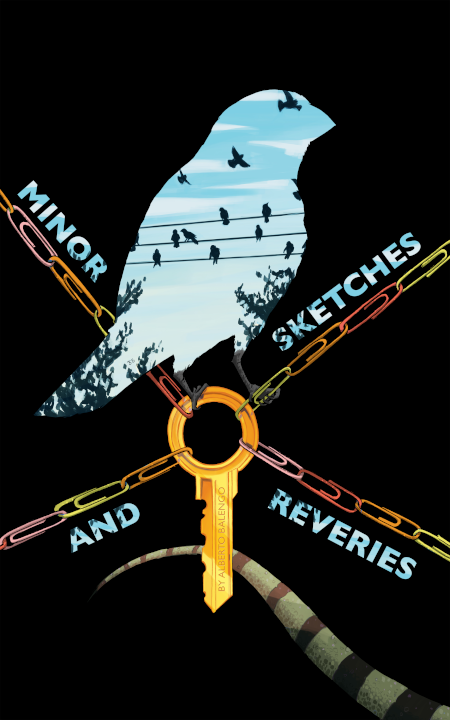
SHORT FICTION
Alberto Balengo, cover art and illustrations by Brittany Bethurem
Personville Press
E-book, ASIN: B089GHYB87, 161 pgs., $4.00
November 1, 2020
Right away, this engaging collection of short and not-so-short writings presents readers with two mysteries. First, why has the author chosen to use a pseudonym? And, second, why is the modest qualifier “Minor” employed as a key part of this book’s title? This entertaining work can be enjoyed by fans of literary and experimental fiction as well as by others who remain open to surprises or do not demand traditional story structures.
Alberto Balengo’s Minor Sketches and Reveries offers fourteen refreshingly unusual tales. Some involve “allegories and melodramas of everyday life,” such as a man’s panicked search for a lost apartment key or a fired computer programmer’s efforts to completely erase a digital footprint, while he proclaims: “The past is unnecessary, the future is unknowable; the present requires only nimbleness.”
Other narratives are written from surprising perspectives such as the mind of a dog, the mind of a sparrow trapped inside a supermarket, or even the “mind” of an inanimate object, in particular one paperclip among many in a box, pondering a normal day of existence: “Life was less of a struggle than a dumb lottery about who would be grabbed next. Everyone joked about it, but only because it was too terrifying to contemplate what it would be like to be plucked away.”
Most of the tales in this book do not offer fiction’s traditional beginnings, middles, and endings. Indeed, some of Balengo’s sketches and reveries create intriguing flows of mental images and then suddenly cease, leaving their stories suspended mentally in midair. Yet these fragments work as experimental fiction pieces and can leave lingering thoughts and images in readers’ minds.
Balengo’s writing style sometimes offers moments of sharp tension for his characters, yet more often flows toward clear, calm descriptions, philosophical contemplation, and efforts to accept or make sense of both human and nonhuman realities.
For example, here is how Balengo imagines the thoughts of an earthworm pondering the flow of its lowly existence:
“Some believe the ground is slow and intractable. Nothing can be further from the truth. Dirt is soft and pliable and ever changing. I have revisited the same mound days or weeks later and discovered nuances not there earlier: the moisture, the acidity, the temperature … even the microorganisms. I find new plant roots, fellow bugs and even the random indentations from feet and beaks. Every centimeter of dirt seems to have an infinite capability to astonish and please, and yet I rarely linger long enough to ponder why. The pleasure of discovery departs as quickly as it arrives, but that does not deter me from proceeding, especially when I think of all the terrains not yet discovered.”
Not all of Balengo’s stories are short. In a fictional essay titled “Indolence: Notebooks,” the narrator deliberately pushes his philosophical inquiry into laziness to absurd academic levels, inducing naps both for himself and his readers.
At another point in the book, Balengo humorously opens the first of three related short sketches with the following aside: “A long while ago I applied (unsuccessfully) to the University of Houston graduate program for creative writing. Here are 3 fake recommendation letters I included with the application.” The “letters” are from a wildly improbable trio: François Rabelais, Franz Kafka, and Hans Christian Andersen.
What happened after Balengo actually sent the fake letters is eye-opening, and he describes the memorable outcome in a section titled, “Notes about these stories,” near the back of his book. This section delves into what inspired him to write each of the stories in his collection, and fellow writers and readers alike can find both amusement and inspiration in his quirky reminiscences.
The “about the author” portion of the book, meanwhile, describes “Alberto Balengo” only in bare detail: a New Mexico native who grew up in Texas and likes dogs but hates football; a medical professional; a graduate of the Writing Seminars of Johns Hopkins University.
Readers will want to know more and may wonder if there are other published works by this author, pseudonymous or otherwise. The finished book will include illustrations, but these weren’t available at the time of this review. Bottom line, Minor Sketches and Reveries is a book well worth reading.
With so many great books published in such a big state, we'll reach only a fraction of them in our editorial reviews. While we don't accept solicitations for Lone Star Reviews, if you need a professionally written review to reach Texas readers and booksellers—timed with your launch—consider our Lone Star Sponsored Reviews service.
